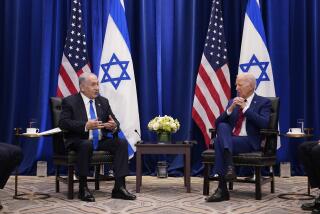Shamir Lauds U.S. ‘Success’ in Gulf Role : Says High-Profile Presence Has Lent Security to Region
- Share via
WASHINGTON — Israeli Prime Minister Yitzhak Shamir congratulated President Reagan today on “the great American success” in the Persian Gulf.
Shamir, talking to reporters after a brief meeting with Reagan in the Oval Office, said the high-profile U.S. military role in the gulf has lent security and stability to the troubled region, where Iran and Iraq have been waging war for seven years.
Shamir arrived here after telling an audience in Miami Beach on Thursday night that his nation’s relationship with the United States has never been better. He also offered to go anywhere for peace talks, including Jordan or other Arab countries.
The Israeli leader told 3,000 Jewish leaders at the 56th general assembly of the Council of Jewish Federations that King Hussein of Jordan is a natural choice as a partner with Israel in the search for Middle East peace.
“We would like to play host to him. . . . If necessary, we shall travel anywhere and negotiate until we reach agreement,” Shamir said in Miami Beach.
Speaking to reporters gathered in the White House driveway today, Shamir credited the U.S. escort operation in the Persian Gulf sea lanes with having a calming and moderating influence in the region.
‘Changed the Situation’
“We had a good conversation with the President,” the prime minister said of his talks with Reagan, which came during an unofficial visit by the Israeli leader about 10 days after Israeli President Chaim Herzog, who holds a mostly ceremonial post, paid a state visit here.
“I congratulated him on the great American success in the Persian Gulf,” Shamir said. “It changed the situation in our area.”
Speaking of the Arab League summit last month in Amman, Jordan, he said, “There is some sign of moderation, and I think that the impact of the American activity in the Persian Gulf was very clear in this summit.”
Shamir said it seemed to him that the moderate Arab states had gained “the upper hand.”
Shamir cited the decision by most of the moderate countries in the Arab world to resume diplomatic relations with Egypt.
More to Read
Sign up for Essential California
The most important California stories and recommendations in your inbox every morning.
You may occasionally receive promotional content from the Los Angeles Times.










